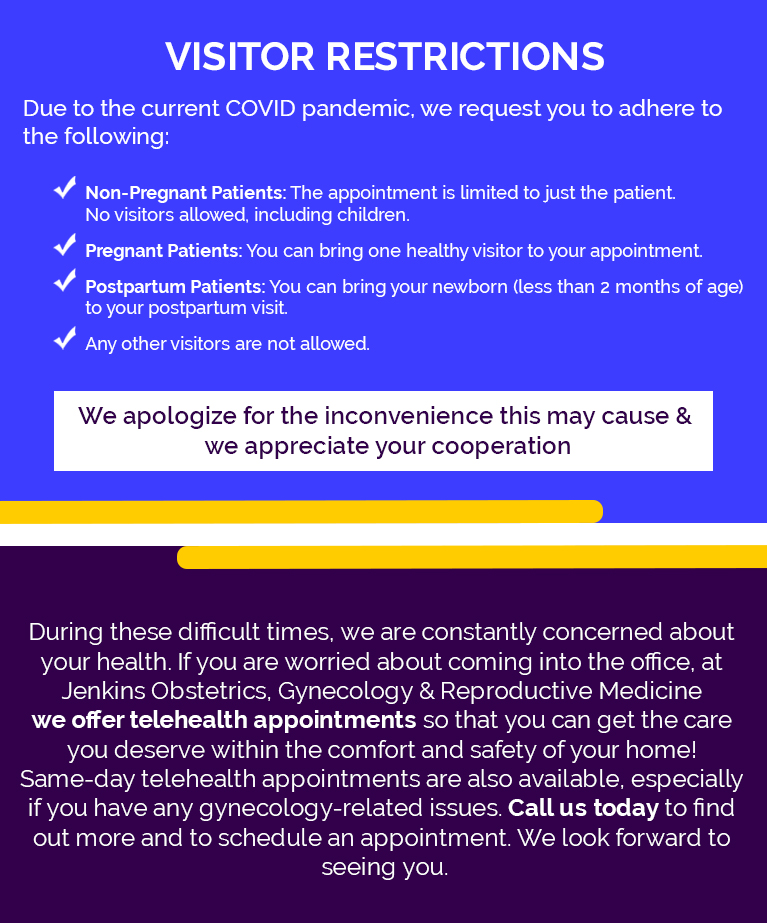

21
Oct
Stop suffering from pelvic pain or urinary incontinence with pelvic floor surgery in Katy, TX

“Mommy bladder” and other pelvic issues are topics that women joke about after they have kids, but their real-life consequences can cause pain and embarrassment. Many women suffer for years before seeking treatment for pelvic floor disorders because they are uncomfortable talking about their symptoms with their doctor. Dr. Taryll Jenkins at Jenkins Obstetrics, Gynecology & Rewproductive Medicine in Katy, TX is an expert in diagnosing and treating pelvic floor disorders and urinary incontinence with surgery and other measures and can help start you on the road to recovery from your symptoms.
Conditions that pelvic floor surgery can treat
There are two conditions that pelvic floor surgery is typically used to treat:
- Prolapsed uterus: This occurs when the uterus is no longer able to be supported by the muscles and tissues in your pelvis and it starts to put pressure on the vagina or to push through the opening in the vagina. It can cause unpleasant symptoms such as the inability to empty your bladder fully; pulling, heaviness, or aching in your pelvis or abdomen; and frequent urinary tract infections.
- Urinary incontinence: When your pelvic muscles and tissues are weakened, your bladder may drop into your vagina and cause accidental leakage of urine, as well as painful and frequent urination or the sensation of an urgent need to urinate due to the stress placed on your bladder. This weakening can occur due to pregnancy or childbirth, or the natural aging process.
In both cases, pelvic floor reconstruction can help stop your suffering and regain your quality of life.
855-346-8610
281-347-2600
Prolapsed uterus treatment
If you have a prolapsed uterus, your doctor will typically try conservative measures to treat the condition first, such as changing your diet, reducing the amount of fluid you drink, and losing weight. If other measures fail and your symptoms are severe, your doctor may recommend surgery.
The goal of pelvic floor surgery for a prolapsed uterus is to shift your uterus back into its normal position and increase the support provided by your natural muscles and ligaments so it does not come out of place again. There are several different types of pelvic reconstruction surgery. The type of surgery needed depends on your symptoms and treatment goals, which your doctor will discuss with you. Your recovery time depends on the type of surgery you have, but it usually requires rest from vigorous exercise, sexual intercourse, and heavy lifting for six to eight weeks.
Treatment for urinary incontinence

Urinary incontinence can be caused by a variety of issues but living with it every day can have huge effects on your quality of life. Childbirth, hormones, and simple gravity can impact the floor of your pelvis, and if more conservative measures such as Kegel exercises, medication, and physical therapy don’t help restore normal bladder function, your doctor may recommend pelvic floor surgery.
In urinary incontinence, the goal of pelvic floor reconstruction is to relieve your symptoms and improve the function of your bladder without causing any changes in your sexual function. A bladder suspension surgery can be performed to pull your bladder back into place and secure it, so it stays there. Different methods that can be used to perform this surgery and your doctor will discuss the best options for you. It is important to note that the effect of this surgery may not last forever and that symptoms may return at some point, and it does not help with urinary incontinence that is due to urgency rather than physical stress on your bladder. Recovery time for this type of surgery is typically six to eight weeks.
Determining if pelvic floor surgery is right for you You may have suffered for many months or years before consulting with your doctor about treatment for your pelvic floor condition. Your doctor can conduct an exam, evaluate your symptoms, and discuss your treatment goals to help determine if pelvic floor surgery or other options are the right choice for you.
Dr. Taryll Jenkins and his team at Jenkins Obstetrics, Gynecology & Reproductive Medicine are committed to providing personalized and high-quality care for women at all phases of life. Call 855-346-8610 today to schedule a consultation on how you can start relieving your symptoms.
Share this Article
Jenkins Obstetrics, Gynecology & Reproductive Medicine
Connect with Dr. Jenkins on Linkedin





We offer general care, gynecology, and obstetrics services that span all stages of a woman's life. Dr. Taryll L. Jenkins, MD received his undergraduate degree from Louisiana State University and Doctorate of Medicine from Meharry Medical College School of Medicine, TN. He completed his residency training at the University of Texas and Hermann Hospital, TX and is Board-certified from the American College of Obstetrics and Gynecology, with years of research experience.
Having graduated from the University of Texas at Arlington with a Bachelors of Science in Biological Chemistry in 2011, Dr. Stephanie Roy received her Doctor of Medicine Degree in 2015 from the University of Texas Medical Branch. Today she is a leading Board-certified physician who works hard to provide you and your family with high quality services. In addition to spending time at the practice, Dr. Roy possesses extensive volunteer experience in the community. She was also a tutor at the Medical Careers Diversity Program in 2012 and since then has spent her free time volunteering for the St. Vincent’s Clinic.
Dr. Tiffany Ikwuagwu is passionate about caring for the diverse communities in Katy and Houston, TX. Having completed her undergraduate degree at the University of Houston, her medical degree at the Baylor College of Medicine, and her residency in obstetrics and gynecology at the McGovern Medical School, she worked as principal investigator on a research project with Dr. Nana Ankumah at UT Houston. A member of the American Medical Association, Texas Medical Association, and American College of Obstetricians and Gynecologists, Dr. Ikwuagwu has served in several leadership roles and has made many contributions to the community.
Yara Ramirez, MD earned her Bachelor of Science degree from Baylor University and her doctorate in medicine from the University of Texas Medical Branch (UTMB) in Galveston where she also completed her residency. She won the Resident Teaching Award from UTMB’s Department of Obstetrics and Gynecology for two consecutive years.
Dr. Ramirez has researched extensively on many obstetrics-related topics. She has been a Junior Fellow Representative for the UTMB Residency Program and a Medical Student Education Committee Member at the American College of Obstetrics and Gynecology. She has volunteered for various local and foreign community programs. Her fluency in Spanish and French is an asset to her organization.
Nadia Alexander is a Board-certified Family Nurse Practitioner with a Master’s of Science degree in Nursing from the University of Texas Health Science Center. With seven years of experience in women’s health and a focus on obstetrics and ambulatory gynecology (vaginitis, UTI, and vaginal bleeding), she provides quality, compassionate care to patients in various stages of reproductive life. She is fluent in English and Spanish and is the lead contact for our Telehealth service.

































